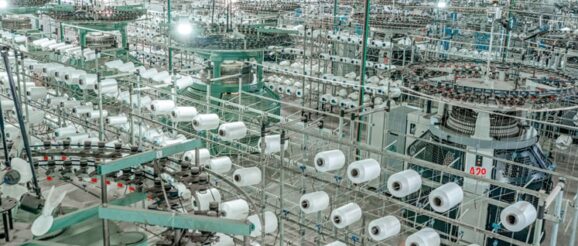Apparel companies moving ahead with innovation on fabrics | Apparel Resources

Apparel manufacturing is constantly striving for innovation, improvement and adaptability at all levels. And at the same time, sustainability is also highly significant for being the preferred choice for buyers. There are few forward-thinking companies that have focused on these fronts and especially their efforts at the fabric stage have emerged as a strong growth driver for them. Tirupur-based BS Apparel and Techno Sports are two such perfect examples as their efforts towards fabric development have made them different compared to their peers.
Following the mantra of performance through innovation, BS Apparel is among the few apparel manufacturers that have started working on niche segments like bamboo-based fabric long back and got its advantage also. The company started as a fabric supplier and slowly moved into garments. Today it is among the very few Indian apparel suppliers of Puma. The company has proprietary patent-pending Bamboo Performance Technology which uses yarn made of BCI-certified 100 per cent organic cotton, bamboo fibre and just a tiny bit of elastane to provide apparel with right amount of stretch and wicks away sweat!
The company is importing bamboo fibres from China and has a strong partnership to ensure an ethical supply chain. Due to faster absorbance and faster drying characteristics and also being antibacterial, garments made by bamboo blends are preferred in the market.
The company offers garments made by Ultraviolet Protection Factor (UPF) 50+ fabrics that block 98 percent of the sun’s rays and allow only two percent to pass through, significantly reducing the risk of exposure, as well as moisture-managing fabrics designed for eczema patients, especially developed for US brand TASC.
This has created a win-win situation both for the brand as well as the company. With Coolibar growing very well with niche and innovative products, BS Apparel has also achieved very good growth along with it.
Having state-of-the-art infrastructure, 900 sewing and 40 circular knitting machines, in-house embroidery, the BSCI-certified company, BS Apparel is offering mainly activewear and innerwear. The company plans to reach sales of Rs. 210 crore in 2022, up by Rs. 90 crore.
B. Vijayaragavan, MD and Promoter of the company was interested in innovations in fabric, so he had proper education in made-made fibre technology. “I was very much clear from day one that we have to be ahead of the market in terms of products, so we could be able to leverage on the margins,” he said.
What drives him forward is his commitment to creating beautiful, sustainable garments that people will love to wear. He says, “We are always looking for new ways to reduce our environmental impact, and we are constantly innovating to bring you the best possible products”.
And as innovation, product development are continuous processes, the company has already started exploring merino wool and recycled polyester. B Vijayaragavan believes that now the future lies with merino wool and recycled polyester, as they are very promising for activewear. The company is one of the first movers testing the market with its products both internationally and domestically. The company’s buyers are also motivating the organisation to have focus on niche segments like wool-base blends etc.
There are two main reasons why recycled polyester and merino wool are used instead of traditional fabrics like cotton or nylon. First, they are more sustainable since they require less energy and water to produce. Secondly, they have better performance properties, such as being durable, breathable and absorbent. The absorption capability of merino wool is twice as much as standard cotton and a staggering thirty times more than polyester.
Techno Sports: Continuously exploring new-age raw materials
In the beginning of its operations (2007), Sunil Jhunjhunwala of Techno Sports used to outsource fabric from North and West India. Later the company started importing from China and Taiwan. And learning from all this experience in 2014, Sunil started his own fabric production.
Keeping issues in mind like high air permeability, moisture management, UV protection, anti-microbial, stretch recovery, thermal retention and anti-static properties, the company is using polyester filament yarns majorly.
Techno Sports was hailed as one of the leaders in the activewear industry that manufactured and sold over 10 million (1 crore) garments in 2021. With a current revenue of Rs. 200 crore, the company aims for 5X growth in the next three years.
Sunil believes that regular filament yarn, which is mostly used by Indian activewear brands, is not of great quality, as a result, they are concentrating on using profiled filament yarns and processing additives, as well as altering the basic DNA of polyester to produce a wider range of fabrics. The company’s in-house lab uses hundreds of yarns and chemicals from across the world and makes various fabrics which are analysed at various labs to find the perfect combination of comfort and style.
Having a team of 20 people in R&D and design, the company spends two per cent of its annual revenue on R&D, in close collaboration with WRA (Wool Research Association). Data collection on fabrics and fibres is its major thrust area and it is continuously exploring new yarns from across the globe.
Almost twice a week, the team of the company test and record data of newly sourced yarn or fabric. They use predictive analysis to identify which materials are best for which purposes. The company sponsors and sends its employees for higher education overseas every year who come back and help the company in R&D.
Having a knitting unit also, the company has plans to set up a new mill for synthetic knits fabric unit under the PLI scheme, where it will install many new technologies for fabric manufacturing. This will give the company efficient capacity to be scalable with larger backend data integration.
“We have established Techno Sports as a successful activewear brand that is best in quality as well as affordable. Its major credit goes to our efforts at the fabric stage,” said Sunil.
